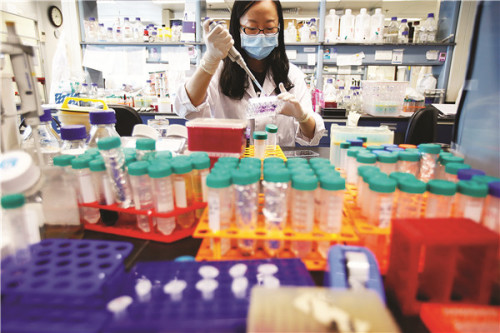
A researcher works at the State Key Laboratory of Digestive Disease at the Chinese University of Hong Kong. The lab, established by the university and the Fourth Military Medical University in Shaanxi province, is the epitome of cross-boundary research collaboration. (Photo/China Daily)
Experts are calling for greater cooperation to boost scientific development.
Greater cooperation in science and technology between Hong Kong and the mainland will maximize the strengths of both sides, according to Joseph Sung Jaoyiu, a leading biomedical scientist in the city.
Sung welcomed a recent instruction issued by President Xi Jinping calling for enhanced collaboration in science and technology between the mainland and Hong Kong, and supporting the city's aim of becoming an international center for innovative technologies.
"President Xi's instruction opens a door for Hong Kong scientists and researchers," said Sung, a former vice-chancellor of the Chinese University of Hong Kong.
"It gives our research jobs flexibility. Easy transportation between Hong Kong and Guangdong province facilitates exchanges between Hong Kong and mainland researchers. In future, research teams in Hong Kong could apply for State funding directly without having to team up with mainland researchers."
While Hong Kong has a number of advantages in terms of scientific research and development across a range of disciplines, researchers from the city often struggle to access funding and other forms of financial support to sustain their projects.
"Though some obtain research funding from the local government, the sums are sometimes far from enough to carry out costly projects. As a result, we can only produce research papers or sell our patents," Sung said.
"This is not the case on the mainland, where institutes and enterprises have large research and development budgets that we cannot match."
Hong Kong scientists and researchers will now be able to secure national funding and support, as long as the project includes experts both from Hong Kong and the mainland.
Sung and his team were among the first beneficiaries, having been granted 990,000 yuan ($155,828) at the end of last year for research into digestive cancers.
Stronger together
Sung has been hailed as an "Asian hero" for his accomplishments in combating the outbreak of severe acute respiratory syndrome that struck Hong Kong in 2003.
He believes that cross-boundary collaboration will allow both sides to maximize their strengths and complement their disadvantages. "Research findings, scientific papers, scientific theories and even products coming from joint projects are more likely to find their way into the world," he said.
He noted that Hong Kong began collaborating with international research organizations much earlier than the mainland, particularly on subjects such as biomedicine.
"Therefore, local scientists are familiar with the standards and clinical designs involved in research and clinical tests," he said, adding that's why research breakthroughs made in Hong Kong are more likely to be recognized overseas.
"If a certain medicine is developed phase by phase in Hong Kong (with the involvement of researchers from the city), the chances of obtaining international recognition and being introduced to the international markets rise."
However, Hong Kong researchers barely equal their mainland counterparts when it comes to the number of medical cases seen and patients dealt with, meaning that researchers in the mainland have richer clinical experience.
"With only 7 million people in our city, it's no surprise that our doctors encounter fewer cases of each type of disease, even fewer cases than doctors in such major cities as Guangzhou (Guangdong province) and Shanghai," Sung said.
Job opportunities are a major concern for many graduates in Hong Kong who aspire to research positions because such posts are hard to find, while R&D jobs are easily available in mainland companies and organizations.
Some observers have warned that the situation could see Hong Kong experience a "brain drain" if local graduates seek employment in the mainland, but it's not a big issue for Sung, who said "any scientific discovery has a global impact, regardless of where the talent works and lives".
However, he said the Hong Kong government must make greater efforts to improve employability in R&D because talent can only be attracted and retained by offering promising career prospects.
Sung said young people in the city should adopt a broader vision on career development. "R&D jobs can't be completed in one or two years; it needs patience. The government's support for the younger generation should be sustainable because it's not a matter of offering support for six months. Cultivating a tree does not happen that quickly," he said.


















































